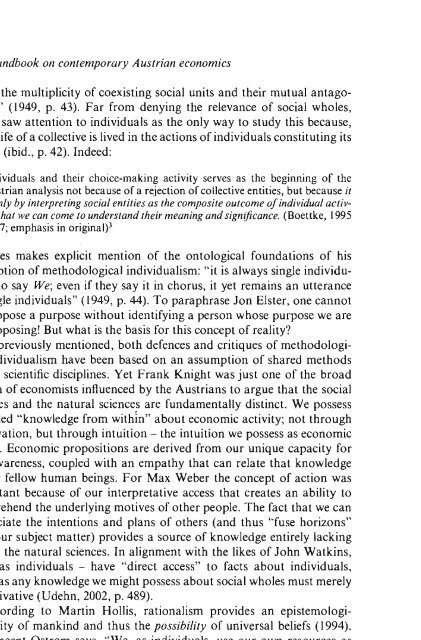Handbook on Contemporary Austrian Economics
Handbook on Contemporary Austrian Economics
Handbook on Contemporary Austrian Economics
You also want an ePaper? Increase the reach of your titles
YUMPU automatically turns print PDFs into web optimized ePapers that Google loves.
8 <str<strong>on</strong>g>Handbook</str<strong>on</strong>g> <strong>on</strong> c<strong>on</strong>temporary <strong>Austrian</strong> ec<strong>on</strong>omics<br />
with "the multiplicity of coexisting social units and their mutual antag<strong>on</strong>isms"<br />
(1949, p. 43). Far from denying the relevance of social wholes,<br />
Mises saw attenti<strong>on</strong> to individuals as the <strong>on</strong>ly way to study this because,<br />
"The life of a collective is lived in the acti<strong>on</strong>s of individuals c<strong>on</strong>stituting its<br />
body" (ibid., p. 42). Indeed:<br />
Individuals and their choice-making activity serves as the beginning of the<br />
<strong>Austrian</strong> analysis not because of a rejecti<strong>on</strong> of collective entities, but because it<br />
is <strong>on</strong>ly by interpreting social entities as the composite outcome of individual activity<br />
that we can come to understand their meaning and significance. (Boettke, 1995<br />
p. 27; emphasis in original)3<br />
Mises makes explicit menti<strong>on</strong> of the <strong>on</strong>tological foundati<strong>on</strong>s of his<br />
c<strong>on</strong>cepti<strong>on</strong> of methodological individualism: "it is always single individuals<br />
who say We; even if they say it in chorus, it yet remains an utterance<br />
of single individuals" (1949, p. 44). To paraphrase J<strong>on</strong> Elster, <strong>on</strong>e cannot<br />
presuppose a purpose without identifying a pers<strong>on</strong> whose purpose we are<br />
presupposing! But what is the basis for this c<strong>on</strong>cept of reality<br />
As previously menti<strong>on</strong>ed, both defences and critiques of methodological<br />
individualism have been based <strong>on</strong> an assumpti<strong>on</strong> of shared methods<br />
across scientific disciplines. Yet Frank Knight was just <strong>on</strong>e of the broad<br />
stream of ec<strong>on</strong>omists influenced by the <strong>Austrian</strong>s to argue that the social<br />
sciences and the natural sciences are fundamentally distinct. We possess<br />
so-called "knowledge from within" about ec<strong>on</strong>omic activity; not through<br />
observati<strong>on</strong>, but through intuiti<strong>on</strong> - the intuiti<strong>on</strong> we possess as ec<strong>on</strong>omic<br />
actors. Ec<strong>on</strong>omjc propositi<strong>on</strong>s are derived from our unique capacity for<br />
self-awareness, coupled with an empathy that can relate that knowledge<br />
to our fellow human beings. For Max Weber the c<strong>on</strong>cept of acti<strong>on</strong> was<br />
important because of our interpretative access that creates an ability to<br />
comprehend the underlying motives of other people. The fact that we can<br />
appreciate the intenti<strong>on</strong>s and plans of others (and thus "fuse horiz<strong>on</strong>s"<br />
with our subject matter) provides a source of knowledge entirely lacking<br />
within the natural sciences. In alignment with the likes of John Watkins,<br />
we - as individuals - have "direct access" to facts about individuals,<br />
whereas any knowledge we might possess about social wholes must merely<br />
be derivative (Udehn, 2002, p. 489).<br />
According to Martin Hollis, rati<strong>on</strong>alism provides an epistemological<br />
unity of mankind and thus the possibility of univ~rsal beliefs (1994).<br />
As Vincent Ostrom says, "We, as individuals, use our own resources as<br />
human beings to attempt to understand others, presuming as Hobbes<br />
did that there is a basic similitude of thoughts and passi<strong>on</strong>s characteristic<br />
of all mankind" (1997, p. 105). Therefore, Hodgs<strong>on</strong> (2007) is quite<br />
correct to argue that methodological individualism isn't simply a neutral

















